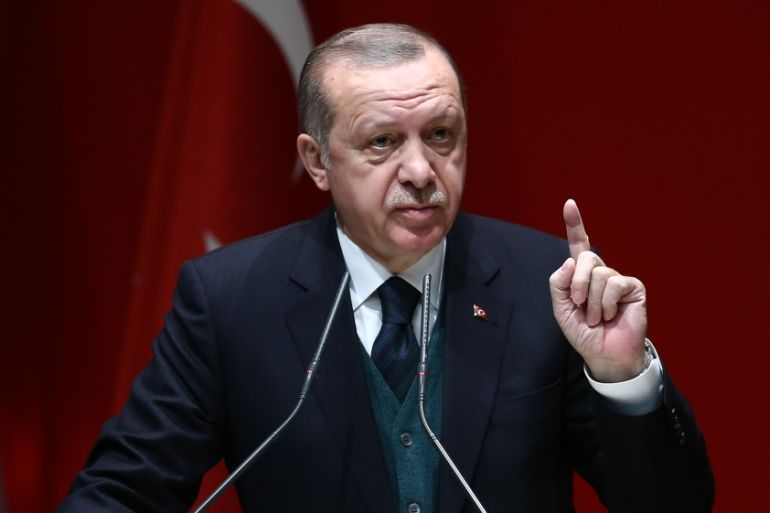Turkey’s Erdogan calls for snap elections on June 24
The parliamentary and presidential polls had previously been slated for November 2019.

Turkish President Recep Tayyip Erdogan has called for snap parliamentary and presidential elections to be held on June 24, more than a year earlier than planned.
In an address at his presidential palace on Wednesday, Erdogan said the country urgently needed to make the switch to an executive presidency.
Keep reading
list of 4 itemsTurkish opposition wins major cities in local elections
What shapes Turkey’s municipal elections?
Turkey offers to host Russia-Ukraine peace talks as Erdogan hosts Zelenskyy
The date will still need to be confirmed by the election commission, he said, but preparations would begin.
His comments came after meeting Devlet Bahceli, head of the Nationalist Movement Party (MHP), who, a day earlier, had floated the prospect of early polls.
The parliamentary and presidential polls had previously been slated for November 2019.
Nationalist sentiment
The call for an early election comes as nationalist sentiment is running high over Turkey’s recent military operation in Syria that pushed Syrian Kurdish forces from a northern enclave.
Erdogan said during the address that the new system needs to be implemented quickly in order to deal with a series of challenges, including Turkey’s fight against Kurdish fighters in Syria and Iraq.
“Be it the cross-border operations in Syria, or incidents of historic importance centred in Syria and Iraq, they have made it imperative for Turkey to overcome uncertainties quickly,” Erdogan said.
Ankara has labelled the Syrian Kurdish fighters “terrorists”, saying they are affiliated with an outlawed Kurdish group fighting inside Turkey.
Presidential system
With the upcoming election, Turkey will switch from a parliamentary system to a presidential one that will increase the powers of the president.
The system was changed in an April 2017 referendum that was narrowly won by the government’s “yes” camp.
The constitutional changes passed in the vote give the next president new powers to appoint vice presidents, ministers, high-level officials and senior judges. They also allow the president to dissolve parliament, issue executive decrees and impose states of emergency.
Erdogan-Bahceli alliance
The snap elections were called a day after Bahceli made a surprise call for elections in the summer.
Bahceli argued that there is “no point in prolonging this any longer”, citing efforts by unnamed groups to foment chaos in Turkey.
Erdogan needs a 51 percent majority to be re-elected in the first round of the presidential election.
Earlier this year, his ruling Justice and Development Party (AK Party), reached an election alliance with Bahceli’s MHP.
State of emergency
In a related development, Turkey’s parliament voted on Wednesday to extend an ongoing state of emergency by another three months. The measure was declared after a failed coup attempt in July 2016.
Parliament was widely expected to extend the measure for a seventh time despite calls at home and abroad for it to end.
The European Union, which Ankara seeks to join, said in a report published on Tuesday that measures undertaken by Turkey under the almost two-year-old state of emergency have curtailed civil and political rights and called for its immediate lifting.
In response, Turkish officials accused the bloc of “bias” and “lacking empathy” over the “terror threat” faced by the country.
The government has asked parliament to extend the emergency decree, arguing that security threats from a movement led by US-based Muslim leader Fethullah Gulen, whom Turkey accuses of masterminding the coup, have not abated.
It also cites Turkey’s continued struggle against Kurdish rebels and other groups.
Gulen has denied any ties to the failed coup.